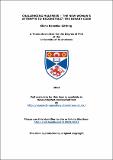Challenging maleness : the new woman's attempts to reconstruct the binary code
Abstract
This thesis explores the construction of masculinity in novels written by New Women
authors between the years 1881-1899. The fin de siècle was a period during which gender roles were renegotiated with fervour by both male and female authors, but it was the so-called New Woman in particular who was trying to transform the Victorian notion of femininity to incorporate the demands of the burgeoning women’s movement. This thesis argues that in their fiction, New Women authors often tried to achieve this
transformation by creating male characters who were designed to justify and to mitigate
the New Woman protagonist’s departure from traditional structures of heterosexual
relationships. The methodology underlying this thesis is the notion that men and women were perceived as binary opposites during the Victorian period. I refer to this as the binary code of the sexes. This code assumes that men and women naturally possess
diametrically opposed character attributes, and also that “masculine” attributes are
perforce better than “feminine” ones. In the body of this work, I argue that New Women
authors attempted to contest both of these assumptions by creating, on the one hand,
traditional male characters whose masculinity is corrupted in crucial and recurring ways, and on the other, impaired male characters who cannot assume the traditional role of man. The comparison of the New Woman protagonist with the corrupt traditional man elevates her feminine attributes, while the impaired man’s dependency legitimises her acquisition of what were otherwise considered “masculine” attributes and privileges, thereby contesting the notion that men and women possess sex-specific attributes at all.
The second part of my thesis examines contrasting examples, in which this way
of characterising masculinity – as traditional or impaired – is questioned and
manipulated. It examines the limitations of the New Women authors’ specific approach
to reconstructing the binary code.
Type
Thesis, PhD Doctor of Philosophy
Collections
Items in the St Andrews Research Repository are protected by copyright, with all rights reserved, unless otherwise indicated.

